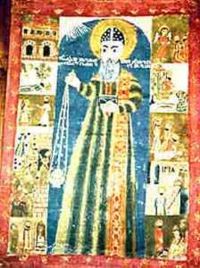Portal:Catholic Church/Patron Archive/June 9 2007

Ephrem the Syrian (Syriac: ܐܦܪܝܡ ܣܘܪܝܝܐ, Afrêm Sûryāyâ; Greek: Ἐφραίμ ὁ Σῦρος; Latin: Ephraem Syrus; ca. 306 – 373) was a deacon, prolific Syriac language hymn writer and theologian of the 4th century. He is venerated by Christians throughout the world, and especially among Syriac Christians, as a saint.
Ephrem was born around the year 306 in the city of Nisibis (the modern Turkish town of Nusaybin, on the border with Syria). Various pagan religions, Judaism and early Christian sects vied with one another for the hearts and minds of the populace. It was a time of great religious and political tension. Ephrem was baptized as a youth, and almost certainly became a son of the covenant, an unusual form of Syrian proto-monasticism. Ephrem was appointed a teacher (Syriac malp̄ānâ. He was ordained as a deacon. He began to compose hymns and write biblical commentaries as part of his educational office. Ephrem is popularly credited as the founder of the School of Nisibis.
When the Roman Empire lost Nisibis to Persia, Ephrem found himself among a large group of refugees that fled west to Edessa (modern Şanlıurfa) in 363. Ephrem, in his late fifties, applied himself to ministry in his new church, and seems to have continued his work as a teacher, perhaps in the School of Edessa. Arians, Marcionites, Manichees, Bardaisanites and various Gnostic sects proclaimed themselves as the true church. In this confusion, Ephrem wrote a great number of hymns defending Nicene orthodoxy. After a ten-year residency in Edessa, in his sixties, Ephrem succumbed to the plague as he ministered to its victims. The most reliable date for his death is 9 June 373.
The most important of his works are his lyric, teaching hymns (ܡܕܖ̈ܫܐ, madrāšê). These hymns are full of rich, poetic imagery drawn from biblical sources, folk tradition, and other religions and philosophies.
Ephrem also wrote verse homilies (ܡܐܡܖ̈ܐ, mêmrê). These sermons in poetry are far fewer in number than the madrāšê. The mêmrê are written in a heptosyllabic couplets (pairs of lines of seven syllables each).
The third category of Ephrem's writings is his prose work. He wrote biblical commentaries on the Diatessaron (the single gospel harmony of the early Syriac church), on Genesis and Exodus, and on the Acts of the Apostles and Pauline Epistles. He also wrote refutations against Bardaisan, Mani, Marcion and others.
Soon after Ephrem's death, legendary accounts of his life began to circulate.
On 5 October 1920, Pope Benedict XV proclaimed that Ephrem is a Doctor of the Church. This proclamation was made before critical editions of Ephrem's authentic writings were available. The most popular title for Ephrem is Harp of the Spirit (Syriac: ܟܢܪܐ ܕܪܘܚܐ, Kenārâ d-Rûḥâ). He is also referred to as the Deacon of Edessa, the Sun of the Syrians and a Pillar of the Church.
Attributes: Vine and scroll, deacon's habit and thurible, with St Basil, composing with a harp
Patronage:Spiritual directors and spiritual leaders
Prayer: Saint Ephrem, sometimes we treat the power of song lightly. Help us to open our hearts and souls to the inspiration of the Holy Spirit given us through music. Amen .
